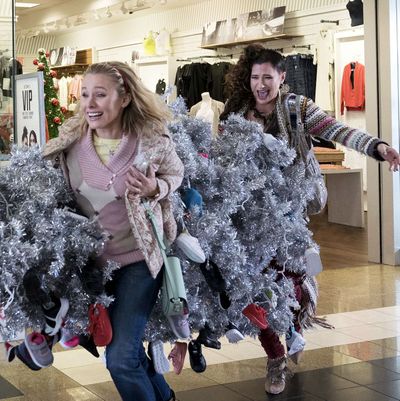
The premise of the second Bad Moms (out today) is not all that different from the original: Christmas is descending upon our three mom protagonists, and with it the societal pressure to make the holiday season “perfect.” It’s difficult to tell, exactly, where this pressure might be coming from, but what’s emphasized, again and again, is how difficult perfection is to achieve when you’re the mom. You’re the one who’s going to shop while carrying seven bags, who’s going to “spend months” (?) searching for perfect gifts, who’s going to affix a puzzling amount of decorations to your very large home. Still, I appreciated this movie and chose to interpret it as a subtle critique of modern motherhood’s insistence on limitations.
Having divorced her useless husband in Bad Moms the first, Amy Mitchell (Mila Kunis) is preparing for Christmas alone for the simple reason that she’s now a single mom. As the main character, Amy is still the most boring of the three moms. She’s the Carrie Bradshaw of the bunch, the watered-down character whose role as the voice of many reduces her to platitudes, like: Why do we put so much pressure on ourselves to make Christmas perfect?
As in the first movie, Kiki (Kristen Bell) and Carla (Kathryn Hahn) are a little more interesting. Kiki tears up regularly and makes strong, sweet proclamations (“I like his panties!” she squeals when a male stripper disrobes), while Carla curses and jokes and sheepishly cops to having kale chips (“They say they’re heart smart”). It’s Carla who answers Amy’s question about pressure with one of her own: Why are they bothering to strive for the perfect Christmas, anyway?
The resultant high jinks are akin to so many comedies like Bad Moms: While not exactly funny, the chaos does look really fun. I would love to drink beers in a mall food court with my friends! I only wish I could go with my family to one of those places that has trampolines for floors! What seems both realistic and disappointing is the reason these scenes are so happy — for once, the moms are not acting like moms. Because moms do not have fun. Moms, with their self-applied quest for perfection, make holidays and their own families unhappy and worse. Why, oh why, can’t moms just loosen up?
This is a question that moms and non-moms alike have long wrestled with, and it makes even moments of rebellion boring. In many pop-culture depictions of moms, rebellion looks like drinking (why do moms have to drink wine? can’t we just admit that wine, on the whole, tastes bad?) and laughing and making a mess. This is not to say that A Bad Moms Christmas is a bad or boring movie. In fact, I think it’s a lot more insightful than it might appear: Because if you stop to think about it, rebellion is only predictable when its source is too. When a mom is someone who is uptight, unfun, and restrictive — someone bent on “perfection” — the only way to rebel is to adopt the most basic opposites within the constraints of her own life. She replaces a beverage with an alcoholic drink, her domestic sphere becomes messy, and her normally restrained personality dissolves into laughter and crassness.
Is there any hope for the mom who wants to be less predictable? Perhaps. This holiday season, each Bad Mom is visited by her own mother, who wreaks havoc by behaving in ways that are delightfully un-mom-like. Unlike their daughters, these grandmas insist that they will enjoy the holidays their way.
Finally, some truly interesting moms! In what appears to follow family tradition, Amy’s mom Ruth (Christine Baranski) seems like the most boring, but isn’t. (Though she is the most racist — Ruth keeps calling Amy’s boyfriend Jesse the wrong name and asking him to take her bags upstairs.) Unlike her daughter’s, Ruth’s quest for perfection is so bizarre it has personality — she sleeps in ironed pajamas, lusts after a Christmas-caroling trophy, and insists the family should see a five-hour production of The Nutcracker. Carla’s mom Isis (Susan Sarandon), much like her daughter, is not concerned with perfection — she’s vulgar and “rock and roll” and oddly ignorant of her grandson’s name. For the majority of the movie, her desires are so “rebellious” and base, they’re a little boring.
This is not the case for Kiki’s mom. Candy (Cheryl Hines), Canadian by birth, is by far the most relatable mom (except for her interest in her daughter’s sex life, and when she buys a house with an all-cash offer). Candy wears pajamas with her daughter’s face on them. She embraces Kiki and breathes deeply, searching for the scent of a baby she once knew. She insists they are best friends. Her behavior is extreme and weird and evident of a deep commitment to being herself.
I’m not sure whether this was the movie’s intention, but Candy’s character was the most inspiring to me. My son is old enough now that I don’t have to worry about providing him breast milk or walking around with him strapped to my chest. There is so much time, suddenly, to think about myself again. A few months ago I was out with friends and someone posed the question of hobbies. What’s my hobby? Hmm. My family, I guess.
Since then, I’ve been obsessed with finding a hobby, some kind of addition that would make me seem like “more” than a mom, whatever that means. My best friend and I are trying to select an enriching class to take, but so far dancing seems too embarrassing and pottery seems too gross. The other night, after spilling water all over myself, I took off my shirt and re-reclined on the couch. “Do you like my new look?” I asked my husband, wondering whether lounging around in a bra could be considered a hobby, or at least a thing. I sincerely wish I were beyond these concerns, but I’m just like the Bad Moms: rendered discontent by anxiety about what a mom is or isn’t.
What I love about A Bad Moms Christmas is the way its silly premise could be mistaken for a brutal takedown of the very narrow way we depict modern motherhood. If the most we can imagine of a mom is a boring commitment to whatever perfect is, the most we can imagine for her rebellion is an adolescent descent into drinking and vulgarity. But if you look to the trio of older, more experienced mothers, you see an interesting group of women unconcerned about being “more” than the people they already are, who don’t need to rebel against anything. I don’t care so much about whether Christmas means I’m involved with holiday decorations and hot chocolate, but I do hope I’m a lot more like the grandmas of Bad Moms by the time my child is grown.





